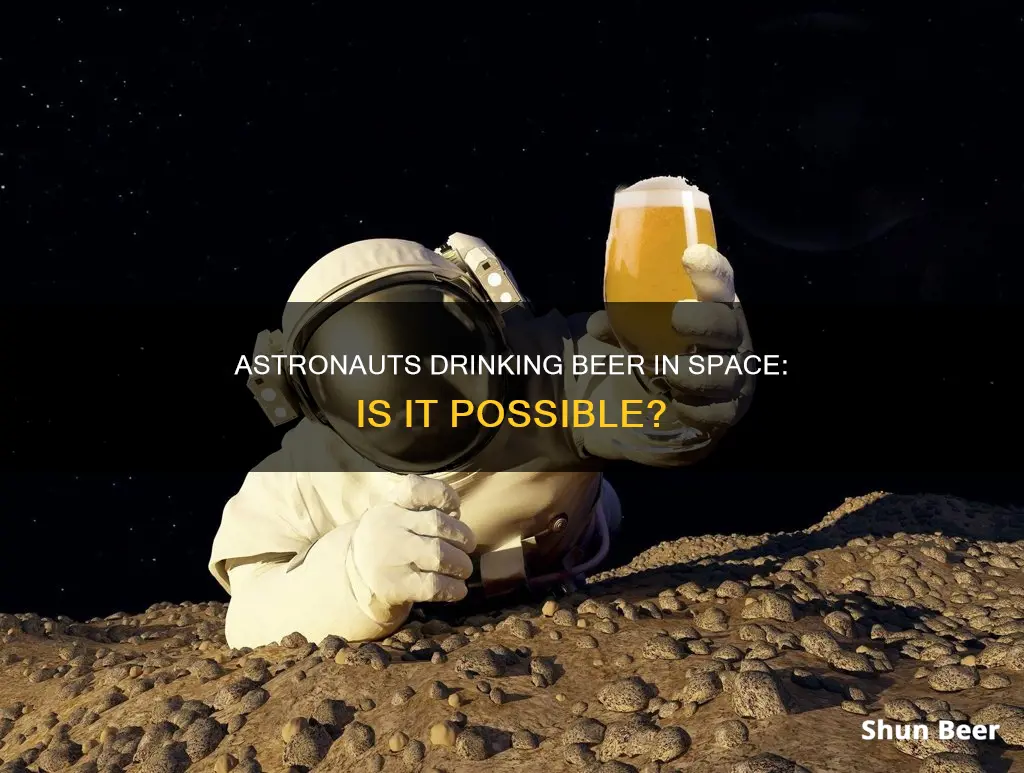
Space travel is stressful and scary, so it's understandable that astronauts might want to unwind with a drink. But is that allowed? The consumption of alcohol in space has a long and complex history. While it is generally disallowed, there have been several instances of astronauts drinking in space, and even plans to send alcoholic drinks into space with them.
| Characteristics | Values |
|---|---|
| Alcohol consumption in space | Generally not allowed |
| Alcohol consumption by NASA astronauts | Prohibited |
| Alcohol consumption by Roscosmos cosmonauts | Allowed in the past |
| Alcohol consumption by ISS crew | Prohibited |
| Alcohol consumption before flight | Prohibited 12 hours before launch |
| Alcoholic drinks in space | Wine, cognac, vodka, whisky, beer |
| Reasons for alcohol prohibition in space | Safety concerns, potential damage to equipment, impact on water recovery system, adverse health effects |
| Challenges of drinking beer in space | Carbonation issues, lack of surface tension, potential adverse side effects |
What You'll Learn
- Astronauts have snuck alcohol into space for decades
- Beer and carbonated drinks cause 'wet burps' in space
- Alcohol was banned from the International Space Station due to its impact on the water recovery system
- The first liquid consumed on the moon was wine
- Experiments have been conducted to study the effects of microgravity on alcohol

Astronauts have snuck alcohol into space for decades
Alcohol is generally disallowed in spaceflight, but space agencies have previously allowed its consumption. NASA has been stricter about alcohol consumption than the Roscosmos, both according to regulations and in practice. Astronauts and cosmonauts are restricted from being intoxicated at launch, but despite these restrictions, there have been experiments in making and keeping alcoholic drinks in space.
In the 1970s, NASA's Charles Bourland planned to send sherry with the astronauts visiting Skylab, but the idea was scrapped because the smell was found to induce a gag reflex in zero-gravity flight tests, and there was ambivalence among the astronauts. Alcohol is prohibited aboard the ISS, but in 2006, the ban on cosmonauts drinking on the ISS was proposed to be lifted.
The first alcoholic drink sent into space by cosmonauts was a bottle of cognac, sent to the Salyut 7 in 1984. Cosmonauts have admitted to smuggling bottles of cognac in their space suits, in intentionally mislabelled 'juice' bottles, and even inside hollowed-out books. One cosmonaut hid a bottle in the wristband of a device used for measuring blood pressure, while another revealed that he went on a crash diet before blastoff so he could sneak a bottle into his suit without exceeding weight requirements.
In 1997, a photo surfaced of cosmonauts at a 'cognac party' aboard the Mir space station, taken by a NASA astronaut. Cosmonauts aboard Mir were allowed alcoholic drinks, including cognac, vodka, and "ginseng liqueur", supposedly for health reasons.
Workplace Attire: Beer Shirts, Appropriate or Not?
You may want to see also

Beer and carbonated drinks cause 'wet burps' in space
Beer and other carbonated drinks are not suitable for consumption in space. The bubbles in these drinks can cause what is known as "wet burps". Burping in space is already an unpleasant experience, as gases and liquids do not naturally separate in the digestive system in microgravity. When an astronaut burps in space, it often results in a “wet burp”, where liquid is expelled along with the gas. This is similar to acid reflux.
The reason for this is that, in microgravity, the light gas bubbles in carbonated drinks do not rise to the top of the liquid and escape. Instead, they stay within the liquid. This means that an astronaut will consume significantly more gas when drinking a carbonated beverage in space compared to on Earth.
In addition to the issue of wet burps, the foam in these drinks also poses a problem. In the absence of gravity, the bubbles do not rise, and therefore a foamy head cannot form. This is another reason why beer and carbonated drinks are not suitable for consumption in space.
The issue of wet burps caused by beer and carbonated drinks is not limited to space. Even on Earth, consuming these drinks can lead to increased gas buildup in the stomach, resulting in the need to burp more frequently. However, the natural separation of gases and liquids in the digestive system on Earth means that wet burps are less common.
Despite the unsuitability of beer and carbonated drinks for space consumption, there have been experiments conducted on the International Space Station involving alcoholic beverages. In 2015, a whisky glass designed for spaceflight was created, and whisky was sent to the ISS for four years to study its flavour development in microgravity. Additionally, some beer companies have sponsored research into brewing beer in space, with the aim of eventually serving beer on Mars.
Hunting and Drinking Beer: Is It Legal?
You may want to see also

Alcohol was banned from the International Space Station due to its impact on the water recovery system
Alcohol is prohibited on the International Space Station (ISS) due to its potential impact on the station's water recovery system. NASA spokesperson Daniel G. Huot has stated that "use of alcohol and other volatile compounds are controlled on the ISS due to the impacts their compounds can have on the station's water recovery system."
The presence of alcohol on the ISS can affect the station's Environmental Control and Life Support System (ECLSS). This is due to the volatile compounds found in alcohol, which can have a detrimental effect on the water recovery system. As a result, astronauts are not provided with any products containing alcohol, such as mouthwash, perfume, or aftershave. The potential damage to equipment and the need for astronauts to maintain full presence of mind and awareness while in space further reinforce the ban on alcohol consumption.
The ban on alcohol in space has been a topic of debate, with some arguing that it should be allowed, especially for civilian trips to Mars, which could take years to complete. However, the potential impact on the water recovery system and the need for astronauts to remain sober and focused while operating complex equipment take precedence.
Despite the ban, there have been instances of astronauts consuming alcohol in space. For example, during the Apollo 11 mission in 1969, Buzz Aldrin drank wine during a secret communion service on the moon. Additionally, Russian cosmonauts have been known to sneak alcohol onto their spacecraft, hiding it in their spacesuits or hollowed-out books.
While the consumption of alcohol by astronauts is generally prohibited, there have been experiments conducted on the ISS involving alcohol. For example, in 2015, Japanese brewer Suntory sent whisky to the ISS to study the effect of microgravity on its flavor. Similarly, NASA has sponsored experiments to study the effect of microgravity on whisky and the aging process.
Scotch and Beer: A Match Made in Heaven?
You may want to see also

The first liquid consumed on the moon was wine
Alcohol is generally prohibited in space due to the potential impact on astronauts' performance and the difficulties of drinking liquids in space. However, the first liquid consumed on the moon was, in fact, wine.
On July 20, 1969, Apollo 11 astronaut Buzz Aldrin, the second man to walk on the moon, took communion with wine and bread before stepping out of the Lunar Module Eagle with Neil Armstrong. Aldrin, an elder at his Presbyterian Church in Texas, wanted to mark the historic occasion in a special way. He collaborated with his minister to consecrate a communion wafer and a small vial of communion wine, which he then took with him to the moon.
Upon reaching the moon's surface, Aldrin made a public statement, inviting listeners to "pause for a moment and contemplate the events of the past few hours and to give thanks in his or her own way." He then ended radio communication and, in silence, read a verse from the Gospel of John before partaking in communion. Aldrin described the experience:
> "In the one-sixth gravity of the moon, the wine slowly curled and gracefully came up the side of the cup. I ate the tiny Host and swallowed the wine. I gave thanks for the intelligence and spirit that had brought two young pilots to the Sea of Tranquility. It was interesting for me to think that the very first liquid ever poured on the moon and the very first food eaten there were the communion elements."
Aldrin's communion on the moon was kept private due to a legal battle between NASA and Madelyn Murray O'Hare, an opponent of religion, over the Apollo 8 crew reading from Genesis while orbiting the moon during Christmas.
The Magic of Bottoms-Up Draft Beer: How Does It Work?
You may want to see also

Experiments have been conducted to study the effects of microgravity on alcohol
In one experiment, researchers from the University of Florida analysed how beer yeast might behave when fermented in outer space. They found that microgravity did not adversely affect the number of yeast cells or their viability. Instead, the rate of fermentation increased, which they attributed to the cells' constant suspension, maximising nutrient availability by preventing settling. However, the yeast exposed to microgravity produced fewer esters, the by-products of fermentation that create both desirable and undesirable beer flavours. The researchers suggested that this could be due to a yeast gene that regulates ester production, as this gene was less expressed in yeast samples exposed to microgravity.
Another experiment involved sending whisky to the International Space Station for four years to study its flavour development in microgravity. The results showed that the tannins in the whisky remained unchanged, but the wood chips yielded higher concentrations of flavour-imparting lignin breakdown products.
While the effects of alcohol on human physiology in microgravity have not been extensively researched, NASA expects that the effects will differ, as medications can have varied effects in space. Beer and other carbonated drinks are generally not suitable for space travel, as the bubbles can cause 'wet burps', and a foamy head cannot form as the bubbles do not rise.
Hawaii's Beach Beer Rules: What You Need to Know
You may want to see also
Frequently asked questions
No, astronauts are banned from drinking beer or any other alcoholic beverage in space. NASA prohibits alcohol on the International Space Station due to the impact it can have on the Environmental Control and Life Support System (ECLSS).
Alcohol can damage equipment and pose a safety risk. It can also cause health issues, such as soggy burps, as liquid and gases can tumble around in an astronaut's stomach in zero gravity.
Yes, there have been several instances of astronauts consuming alcohol in space. The first liquid to be drunk on the moon was wine, during a secret communion service by astronaut Buzz Aldrin. Russian cosmonauts have also been known to drink cognac and vodka on the Mir space station.







